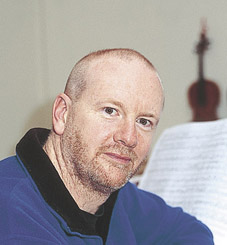Brett Dean’s “Eclipse” highlights Callisto Ensemble program
Brett Dean, an Australian composer who won the 2009 Grawemeyer Award, is one of the most interesting voices among today’s composers. Yet he only arrived where he is by making a bold and unpopular career move. In 2000, the Aussie jettisoned a very comfortable career as violist in the Berlin Philharmonic so he could focus more intently on composing in his homeland, and this roll of the dice is still paying off.

His music is now attracting a sizable listenership in Chicago. At a MusicNOW concert last year, his small ensemble piece Recollections left a considerable impression with its raw lyricism and timbral imagination. The Callisto Ensemble is playing Dean’s music over multiple concerts this season and Monday night featured the local premiere of his haunting Eclipse for string quartet (2003).
Inspired by a fleet of immigrants cruelly turned away at Australia’s borders, the music is not without enduring pain and somber emotions. The violins and viola of Stefan Hersh, Robert Waters and Roger Chase screech, wail and scream but never do so in the name of pure shock. There is a restless beauty underneath these torrents of sound and savage temperament, perhaps best embodied by Julian Hersh’s soulful cello playing.
For all this terrifying treble, the last movement’s sustained and serene dialogue was surely the most memorable. This dissipation to silence felt inevitable and is a good indicator of Dean’s narrative gifts; it’s hard to imagine more trenchant storytelling from another musical ensemble.
In the tiny parlor room of Darnton & Hersh Fine Violins—situated on the 12th floor of a South Loop office building—the space is high on intimacy but low on acoustical brilliance. The sound is exposed to a fault, where some of the mystery is stripped from the music. Sir Arnold Bax’s Trio in one movement (1906) would have benefited from more distance between stage and audience. As violist Roger Chase noted beforehand, Bax is one of the original British Impressionists, but his wonderfully vibrant and imagistic music felt robbed of its colors in the cramped quarters. The string playing still triumphed and Paul Hersh’s sparkling piano was a sound to behold.
George Crumb’s early nocturnal Sonata for solo cello (1955) was an ideal vehicle for the versatile Julian Hersh, with its Segovia-like pizzicatos, faint Irish melodies and full range of emotions. The Toccata’s fiendishly difficult etude was executed with precision and Hersh did a fantastic job holding all disparate elements together.
Pianist Paul Hersh’s solo account of Mozart’s tragic Adagio in B Minor (KV 540) was a welcome addition to the program. At times Hersh’s delivery sounded a bit stiff and pedantic, yet he also directly communicated the anguish in one of Mozart’s most personal compositions.
Posted in Performances



